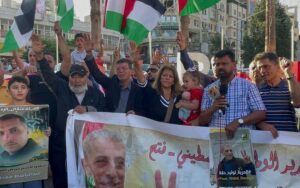The Palestine Walid saw, from the little prison to the big prison

A demonstration in Ramallah in solidarity with Walid Daqqah, 26 August 2023. pictured in the middle is Daqqah’s wife, Sana’ Salameh, carrying their daughter, Milad Daqqah
Faris Giacaman writes in Mondoweiss on 10 April 2024:
In 2013, a close friend sent me a small book that he said was the best analysis we had of our contemporary Palestinian condition in the era of political capitulation and defeat. He insisted that it was required reading for anyone wishing to understand the obstacles to the revival of Palestinian resistance.
The book was unconventional. It presented an extrapolated reading of conditions inside Israeli prisons to Palestinian society writ large, arguing that the feelings of powerlessness that Palestinians experienced in prison were not limited to the confines of the prison’s walls, but were rather felt by all Palestinians everywhere as a “general Palestinian condition” — because the conditions they suffered from were identical to those of political prisoners in Israeli custody.
The study argued that these similarities weren’t just in the fact that both groups were subjected to the same tools of repression, or that they were both internally segregated (into cell blocks and bantustans), but that their captors had the same intention: to “remake people” in the image of Israel’s vision of a docile Palestinian. It would achieve that goal by “dissolving their consciousness, especially the consciousness of the resistance elite within the prisons.”
The work also included a theoretical element, employing Foucault’s reading of the Panopticon to describe how prison surveillance and self-discipline translated into broader social dynamics in Palestinian society. When I first read the Foucauldian jargon, I turned my nose up at the otherwise compelling piece, a product of my aversion to postmodern intellectual fads that I believed had polluted intellectual circles in Palestine. But the basic thesis of the work was convincing enough, and as I read more details about how the internal dynamics between prisoners in the “little prison” mimicked the dynamics of Palestinian society in the “big prison,” I decided that I probably agreed — this study was the closest thing we had to a sober appraisal of why Palestinian resistance had died out after the Second Intifada and why the Palestinian populace had been seemingly pacified.
At the time, I was not acquainted with who the author was or anything about his background. Not many were by that point. Yet the analysis in Walid Daqqah’s Dissolving Consciousness, or: Redefining Torture made its way into Palestinian cultural life and among student and youth activists. Phrases like “sahr al-wa’i” — “dissolving consciousness” — entered common usage in those circles, even when not everyone using the phrase was aware of its provenance.
What was most striking about Daqqah’s analysis was that his entire reading of the world outside the prison was written while he was confined within its walls, where he remained for close to four decades as one of Palestine’s longest-serving political prisoners. More importantly, he understood what was happening outside the prison walls so well because he was experiencing the same thing firsthand from within them.
Daqqah’s works did not begin or end with Dissolving Consciousness. Earlier in 2006, he wrote Parallel Time, which also covered the themes of imprisonment and warned that Palestinians inside the “little prison” and the “big prison” would share in the same fate. It was adapted into a play and performed at a theater in Haifa, after which the theater was forcibly shut down. Over nearly two decades behind bars, he continued to write prolifically about politics and culture, producing works of literature that can be considered one of the few legitimate inheritors of Ghassan Kanafani’s legacy.
